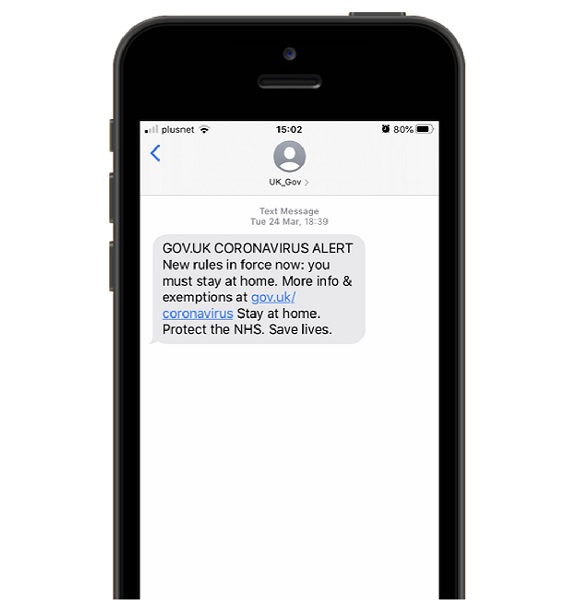Emergency communications are key to effective crisis management. They enable your company or organisation to function as normal during and after an incident. As a crisis can be something as seemingly simple as a carpark closure, they are much more common in business than people think.
In situations where something much larger is at hand, for example, a local emergency, the way a business communicates and responds with employees and customers, can mean the difference between a great response and serious damage to a brand’s reputation.
Amid the coronavirus crisis, many people in the UK received an SMS from the government reiterating guidelines to stay at home. As you can see, this message also included a web link for further information and was signed off with – Stay at home. Protect the NHS. Save lives.
This is a great example of crisis communication. The message was concise, informative and emphasised key points made on other channels, for example, the daily news update. Furthermore, by ending the message with – Stay at home. Protect the NHS. Save lives. it provides recipients a reminder of the ‘why’ behind the measures being implemented.

Why is it important to have a crisis communication plan?
Whether a minor disturbance or global issue like COVID-19, a robust crisis communication plan allows you to respond almost immediately and with a high level of professionalism. Without a plan, you risk losing valuable time, or worse still, sending a communication which isn’t right either in terms of tone or information.
A crisis communication plan should extend across teams and channels. Any teams which are customer facing or likely to receive questions from other colleagues should be included. For example, customer care and human resources. While we would never advise anyone to solely rely on one channel for crisis communication, a multichannel approach is much less risky, as SMS benefits from an average open rate of 95% and 90 second user response time, it is a very effective channel for emergency situations.
While crisis communications will always vary from one situation to another, having a number of templates at your disposal ensures your company is in the best possible situation for disaster recovery. As such, we have pulled together some SMS templates to be used in a number of different scenarios.
Temporary office closure
Good morning, overnight we had a power outage to the [location] office, the team is still working hard to fix. Please log on remotely and await further instruction. We thank you for your patience.
Severe weather conditions
Due to ongoing severe weather conditions, all work will be suspended starting [date] [time]. Please refer to [person in charge] for assistance, they will be in touch with further instruction soon. For more information, check [url]. Thank you.
Mobilise teams
ATTENTION! Mains pipe damage alert at [organisation name] [address] your assistance is required. Please confirm receipt of message and estimated time of arrival for yourself and your team as soon as possible. For more information, please contact [person in charge] on [phone number] as soon as possible.
Local emergency
ATTENTION! There has been an emergency in [location]. Please confirm your location and status as SAFE or REQUIRE ASSISTANCE by responding to this message with your employee ID number. If you require emergency assistance please dial 999.
Appointment cancellation
Hi [name]. Due to unforeseen circumstances, we have had to cancel your appointment at [location] on [date] [time]. To reschedule please contact our team on [phone number] who will be happy to assist.
Service issues
We are aware that some of our customers are experiencing internet connectivity issues in your area. Our team is working hard to resolve the issue. We apologise for any inconvenience caused. The progress of the work can be monitored at [url]. We thank you for your patience.
Above are just a few templates that could be used for SMS crisis communications, but they could easily be adapted for email, website updates or even over the phone. As individuals may feel stressed or even upset during a crisis, it is vital that your company’s message remains consistent across all channels. Afterall, the aim of these messages is to provide clarity and reassurance, not to confuse people.
To learn more about how your business could implement SMS into it’s crisis communication strategy, please contact our friendly team on 0845 122 1302 or at [email protected].


